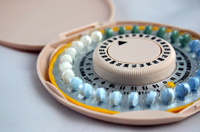Oral Contraceptives
The Birth Control Pill
Also called "the pill," it contains the hormones estrogen and progestin.
 A pill is taken daily to block the release of eggs from the ovaries. It also
lightens the flow of your period and protects against pelvic inflammatory
disease (PID), ovarian cancer, and endometrial cancer.
The birth control pill does not protect against STDs or HIV.
A pill is taken daily to block the release of eggs from the ovaries. It also
lightens the flow of your period and protects against pelvic inflammatory
disease (PID), ovarian cancer, and endometrial cancer.
The birth control pill does not protect against STDs or HIV.
The pill may add to your risk of heart disease, including high blood pressure, blood clots, and blockage of the arteries. If you are over age 35 and smoke, or have a history of blood clots or breast or endometrial cancer, your health care provider may advise you not to take the pill.
The pill is 95% to 99.9% effective at preventing pregnancy if used correctly. You will need a prescription and visits with your health care provider to make sure you are not having problems.
The Mini-Pill
The mini-pill only has one hormone, progestin. Taken daily, the mini-pill reduces and thickens cervical mucus to prevent sperm from reaching the egg. It also prevents a fertilized egg from implanting in the uterus (womb).
The mini-pill also can decrease the flow of your period and protect against PID and ovarian and endometrial cancer.
Mothers who breastfeed can use it because it will not affect their milk supply. The mini-pill is a good option for women who can't take estrogen or for women who have a risk of blood clots.
The mini-pill does not protect against STDs or HIV. Mini-pills are 95 to 99.9% effective at preventing pregnancy if used correctly. You will need a prescription and visits with your health care provider to make sure you are not having problems.

Disclaimer: All information provided in this document is for educational purposes only. It is not intended as a substitute for advice provided by a medical doctor or qualified healthcare provider. You should not use this information for self-diagnosis or for treating a health problem or disease. If you have any questions whatsoever about your medical health or believe you have a medical problem or disease, you should contact your medical doctor or healthcare provider. You should never disregard medical advice or delay seeking medical advice or treatment because of something you have read herein. No guarantee is made about the accuracy, completeness, or relevance of the information contained herein.


